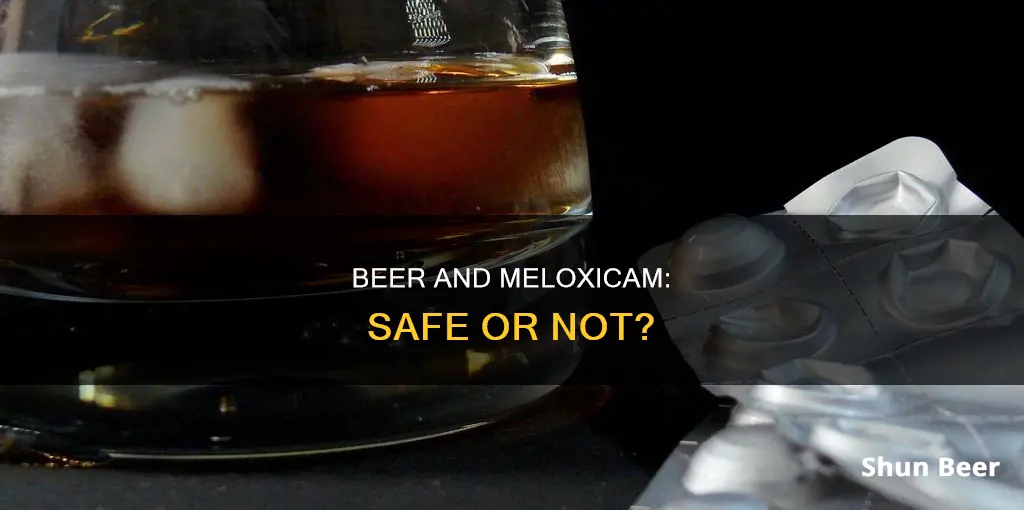
Meloxicam is a nonsteroidal anti-inflammatory drug (NSAID) that is often prescribed to alleviate pain and inflammation associated with various musculoskeletal conditions. While it is a safe and effective medication when used as directed, there are potential risks associated with combining meloxicam with alcohol. Both substances can irritate the stomach lining and increase the risk of gastrointestinal bleeding, and this risk is significantly heightened when they are used together. In addition, the concurrent use of meloxicam and alcohol can lead to liver damage, kidney problems, and an increased risk of cardiovascular events such as heart attacks or strokes. As a result, it is generally recommended to abstain from alcohol consumption while taking meloxicam to avoid these potential health complications.
| Characteristics | Values |
|---|---|
| Can I drink alcohol while taking meloxicam? | It is not recommended to drink alcohol while taking meloxicam due to the potential risks involved. |
| What are the risks of drinking alcohol while taking meloxicam? | Increased risk of gastrointestinal issues such as bleeding, ulcers, and liver damage; heightened risk of cardiovascular events such as heart attack or stroke; central nervous system depression leading to drowsiness and dizziness; overdose. |
| What are the alternatives to drinking alcohol while taking meloxicam? | Non-alcoholic beverages, physical therapy, hot/cold therapy, or other non-pharmacological approaches. |
| What should I do if I have already consumed alcohol while taking meloxicam? | Contact a doctor immediately if you experience any adverse symptoms such as gastrointestinal bleeding, chest pain, or rapid heart rate. |
What You'll Learn

The dangers of mixing meloxicam and alcohol
Meloxicam is a nonsteroidal anti-inflammatory drug (NSAID) often prescribed to patients with arthritis, osteoarthritis, tenderness, and swelling caused by inflammation. It is also used to treat juvenile rheumatoid arthritis.
Mixing meloxicam and alcohol can have detrimental effects on a person's health. Here are some dangers associated with combining these substances:
Increased Risk of Gastrointestinal Bleeding and Ulcers
Both alcohol and meloxicam can irritate the stomach lining and increase the risk of gastrointestinal bleeding and ulcers. When used together, they may exacerbate these effects, leading to a higher risk of stomach-related complications. Alcohol consumption can cause inflammation in the upper gastrointestinal tract and liver, and when combined with meloxicam, it can lead to significant damage to the gastrointestinal tract, resulting in bleeding or ulcers.
Compromised Liver Function
The liver plays a crucial role in metabolizing substances, including medications and alcohol. The concurrent use of alcohol and meloxicam can increase the workload on the liver's metabolic pathways, leading to potential liver stress and compromised function. This elevated workload increases the risk of liver damage.
Cardiovascular Problems
NSAIDs like meloxicam are known to increase the risk of heart attack and stroke. Alcohol consumption can also cause issues with normal heart functioning, leading to possible heart failure, especially in regular binge drinkers. Combining meloxicam and alcohol increases the risk of cardiovascular events.
Central Nervous System Depression
Meloxicam and alcohol both depress the central nervous system (CNS), causing additive effects when combined. This can lead to heightened sedation, dizziness, and impaired coordination.
Kidney Damage
Alcohol and meloxicam can both impact kidney functions. Meloxicam affects renal blood flow and blood pressure-regulating substances, while alcohol causes dehydration and hinders waste elimination by the kidneys. When used together, they pose a heightened risk of compromised kidney function.
Gout Flares
If you are taking meloxicam for gout flares, drinking alcohol can cause a gout flare-up, worsening the joint pain and swelling that meloxicam is intended to relieve.
Other Health Risks
Combining meloxicam and alcohol can also lead to gastritis (inflammation of the stomach), vitamin B12 deficiency, and an increased risk of cardiovascular events, liver damage, and kidney problems.
Crafting Beer: My Career in Brewing
You may want to see also

Short-term symptoms of drinking alcohol while taking meloxicam
Drinking alcohol while taking meloxicam can lead to many health issues. The most life-threatening symptoms include bleeding and ulcers in the stomach and intestines. This can occur at any time without warning during treatment.
- Bleeding: Alcohol consumption alone can cause inflammation in the upper GI tract and the liver. When taken with meloxicam, it can lead to significant damage to the GI tract, resulting in bleeding or ulcers.
- Gastritis: Alcohol can damage the gut flora and the lining of the stomach. Combining it with meloxicam can lead to ulcers, tears, and bleeding in the stomach, disrupting the body's ability to absorb nutrients and potentially leading to a vitamin B12 deficiency.
- Gout: Alcohol consumption can trigger gout attacks and joint pain flare-ups, counteracting the intended effects of meloxicam for gout patients. Mixing alcohol with meloxicam may worsen swelling and inflammation in the affected joints.
- Heart attack/stroke: Alcohol can interfere with normal heart functioning, leading to possible heart failure, especially in regular binge drinkers. As meloxicam also increases the risk of heart issues and stroke, combining it with alcohol can be extremely dangerous. Stop consuming both immediately if you experience chest pains, shortness of breath, pain in the left arm or side of the body, weakness, or other heart attack warning signs.
Beer and Advil: A Safe Mix?
You may want to see also

Long-term risks of regularly mixing meloxicam and alcohol
Regularly mixing meloxicam and alcohol can have severe long-term effects on the body. Both substances negatively impact the gastrointestinal tract, liver, and cardiovascular system. Here are the long-term risks associated with the regular combination of meloxicam and alcohol:
Gastrointestinal Issues
The simultaneous use of meloxicam and alcohol can irritate and damage the stomach lining, leading to gastrointestinal bleeding, ulcers, and gastritis. This combination puts extra stress on the stomach, increasing the likelihood of upper gastrointestinal bleeding. The risk is especially high for individuals with a history of stomach ulcers or gastrointestinal bleeding.
Liver Damage
Alcohol and meloxicam, when used together, increase the workload on the liver's metabolic pathways, contributing to liver stress and potentially compromising its function. The liver plays a crucial role in metabolizing substances, and the excessive load caused by the concurrent use of alcohol and meloxicam can elevate the risk of liver damage.
Cardiovascular Events
Meloxicam, as an NSAID, may increase the risk of cardiovascular events such as heart attacks or strokes. Regular alcohol consumption is also associated with cardiovascular complications, including increased blood pressure, heart disease, and the risk of heart failure. Combining meloxicam and alcohol can, therefore, exacerbate the risk of adverse cardiovascular events.
Central Nervous System Depression
Both meloxicam and alcohol have a depressant effect on the central nervous system (CNS), causing drowsiness and dizziness. When combined, they can lead to heightened sedation, impaired coordination, and increased risk of accidents, particularly when driving or operating machinery.
Other Risks
The regular combination of meloxicam and alcohol can also increase the risk of kidney damage, as both substances can negatively impact kidney functions. Additionally, individuals with pre-existing liver conditions may experience further compromised liver function due to the combined effects of meloxicam and alcohol.
In conclusion, regularly mixing meloxicam and alcohol can have severe long-term consequences, impacting vital organs and systems in the body. It is crucial to consult a healthcare professional before considering the concurrent use of these substances to ensure a comprehensive understanding of the risks involved.
The Science Behind Fizzics Beer: How Does It Work?
You may want to see also

Why is mixing meloxicam and alcohol dangerous?
Mixing meloxicam and alcohol can have severe health risks and this combination should always be avoided. Here are some reasons why:
Increased Risk of Gastrointestinal Bleeding:
Both alcohol and meloxicam can irritate the stomach lining and increase the risk of gastrointestinal bleeding and ulcers. When combined, they may exacerbate these effects, leading to a higher chance of stomach-related complications. This is especially concerning for individuals with a history of stomach ulcers or gastrointestinal bleeding.
Compromised Liver Function:
The liver is responsible for metabolizing substances like medications and alcohol. When alcohol and meloxicam are used together, they increase the workload on the liver's metabolic pathways, potentially leading to liver stress and compromised function. This heightened metabolic activity can elevate the risk of liver damage.
Heightened Risk of Kidney Damage:
Alcohol and meloxicam can both negatively impact kidney functions. Meloxicam affects renal blood flow and blood pressure-regulating substances, while alcohol can cause dehydration and hinder waste elimination by the kidneys. This combination increases the risk of compromised kidney function.
Central Nervous System Depression:
Meloxicam and alcohol are central nervous system (CNS) depressants. When combined, they can cause additive CNS depression, resulting in heightened sedation, dizziness, and impaired coordination. This effect may be more pronounced than when each substance is used alone.
Cardiovascular Risks:
Meloxicam, as an NSAID, is associated with an increased risk of heart attacks and strokes. When combined with alcohol, which can also impact heart functioning, the risk of adverse cardiovascular events may be exacerbated.
Given these potential risks, it is crucial to consult with a healthcare professional before considering the concurrent use of meloxicam and alcohol. Even moderate alcohol consumption may have an impact, and the potential dangers outweigh any benefits.
Drinking Five Beers: Is It Safe?
You may want to see also

Medical opinions on mixing meloxicam and alcohol
Medical professionals generally advise against mixing meloxicam and alcohol. This combination can increase the risk of adverse effects, especially concerning the gastrointestinal system and liver health.
Doctors' Views
Doctors typically advise against mixing meloxicam and alcohol due to the potential risks involved. The simultaneous consumption of these substances can heighten the likelihood of gastrointestinal issues, such as bleeding, and negatively impact liver health. It is crucial for individuals to consult their healthcare provider before considering the concurrent use of meloxicam and alcohol.
Pharmacists' Perspectives
Pharmacists, with their extensive knowledge of medication interactions and risks, often recommend avoiding the combination of meloxicam and alcohol. This is due to the increased possibility of gastrointestinal bleeding and liver damage. Pharmacists play a vital role in educating patients about medication safety and providing essential information to ensure optimal medication use.
Short-Term Risks
The immediate risks of mixing meloxicam and alcohol include an increased potential for gastrointestinal bleeding and heightened sedative effects. Both substances can irritate the stomach lining and enhance the sedative and depressant effects of alcohol, leading to increased drowsiness and impaired motor skills. This combination poses a significant risk when engaging in activities that require alertness and coordination, such as driving or operating machinery.
Long-Term Risks
Regularly mixing meloxicam and alcohol can have severe long-term consequences. The combination may exacerbate the risk of gastrointestinal ulcers, liver damage, and adverse cardiovascular events, such as heart attacks or strokes. Given these potential risks, it is generally recommended to avoid consuming alcohol while taking meloxicam. However, individuals with specific concerns or questions should consult their healthcare provider for personalized advice.
Miller Beer Text Rebates: How Do They Work?
You may want to see also
Frequently asked questions
No, it is not recommended to drink alcohol while taking meloxicam. Alcohol can irritate the stomach lining and increase the risk of gastrointestinal bleeding and ulcers. It can also compromise the liver's ability to function optimally, leading to an elevated risk of liver damage.
The combination of meloxicam and alcohol can lead to mild, moderate, and severe side effects. Mild effects include nausea, headaches, indigestion, and drowsiness. Moderate effects include elevated stomach pain, heartburn, and an increased risk of gastrointestinal bleeding. Severe effects, in rare cases, can include liver damage, kidney problems, and an elevated risk of cardiovascular events.
Mixing meloxicam and alcohol can result in life-threatening gastrointestinal issues, such as upper gastrointestinal bleeding, and heart complications such as heart attacks, strokes, or heart failure. This combination may also lead to liver damage and kidney problems.
If you are considering drinking alcohol while taking meloxicam, it is crucial to consult your healthcare provider first. They can provide personalized advice based on your medical history and specific circumstances. It is generally recommended to avoid alcohol consumption while taking meloxicam to ensure your safety and well-being.







